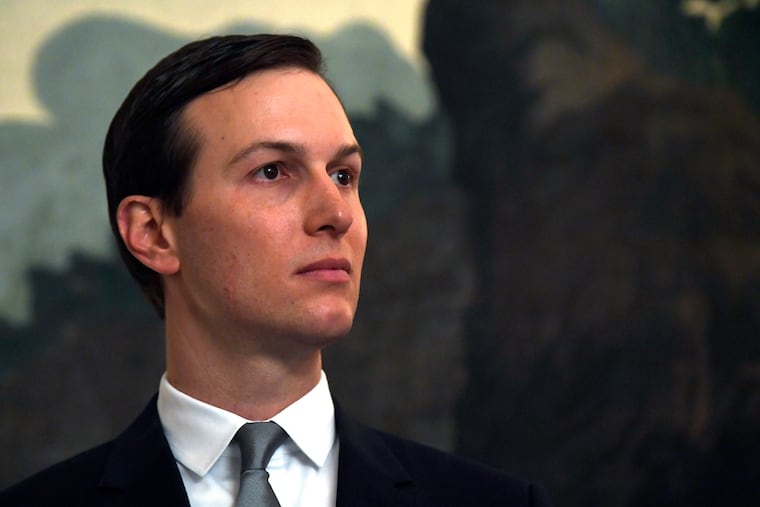Jared Kushner’s economic peace plan at Bahrain conference ignores the key factor for progress | Trudy Rubin
Investors won’t come to West Bank, Gaza, so long as the political situation there is unsettled, and Israel controls and limits land, airspace, seas access, bandwidth, water, and physical movement.

First Son-in-law Jared Kushner will promote the economic phase of his long-awaited Mideast peace plan this week at a conference in Bahrain.
The glossy White House brochure for the conference, as slick as a real estate prospectus, is titled: “Peace to Prosperity: a new vision for the Palestinian people and the broader Middle East.” Lavishly illustrated, the prospectus claims it has the “potential (italics mine) to facilitate more than $50 billion in new investment over 10 years.”
Here is the kicker: the 40-page proposal avoids dealing with the political future of the West Bank and Gaza, or the question of a Palestinian state. Kushner’s political plan has been postponed until after Israeli elections in September, and may not even appear then. Yet a raft of similar economic plans for Gaza and the West Bank failed in past decades because of the political constraints of Israeli occupation.
The brochure never mentions occupation, nor the fact that Israel controls the bulk of West Bank land, the water supply, imports, exports, and freedom of movement, along with air space and sea access in Gaza. These controls deter foreign investors and defeat startups.
Without addressing these political issues, Kushner’s plan is nothing but a pipe dream. Here are five reasons to wonder what he can be thinking, (and there are many more).
5 problems with Jared Kushner’s Middle East economic peace plan
1. The plan claims to be a new vision for Palestinians, yet seems disinterested in Palestinians’ own ideas. The Kushner/Trump approach has been to impose political changes unilaterally – such as recognition of Jerusalem and moving the U.S. embassy to Jerusalem. As a result Palestinian leaders, and most Palestinian businessmen, are boycotting the conference.
Indeed, the Kushner plan comes across as if it was produced by a foreign consulting company that lifted proposals from past plans and never did any field work. Amazingly, it cites “friendly countries” like South Korea, Singapore, Taiwan, Japan, Germany and Sweden, as relevant examples of how Palestinians could develop – without ever mentioning that all those examples are sovereign states.
2. Lack of control over territory and movement makes business investment too risky. Sixty percent of the West Bank is already under Israeli control, and virtually off limits to Palestinians. The White House appears to have abandoned the idea of a two-state solution in favor of limited “autonomy” for the Palestinians on disconnected chunks of the remaining 40 percent.
Moreover, U.S. officials have indicated that Trump may recognize Israeli annexation of Jewish settlements deep within the West Bank. Those settlements and settler roads crisscross the West Bank and make it hard for Palestinians to travel to jobs or farms or get their products to market, especially when they have to cross Israeli military checkpoints.
And Israel has so far rejected a transportation link that would let trade develop between Gaza and the West Bank, such as Kushner proposes.
“There is no investment at all in the Palestinian territories because it is unstable,” says veteran Israeli journalist Danny Rubinstein, an expert on the Palestinian economy. A Palestinian owner of a chain of supermarkets, he explains, “can’t move his goods. Dairy spoils at the checkpoints. You need workers to come on time, but they can’t get through. So no one puts money in because it is so risky.”
Another example of blocked movement: the new town of Rawabi outside Ramallah was begun with much fanfare and investment from the Gulf state of Qatar, in order to produce thousands of modern apartments and a mall for Palestinian professionals. But development was held up for years because Israel controlled the main access road, which it used as a political bargaining chip. When I visited 18 months ago, Rawabi felt like a ghost town, with buyers scared off by the political uncertainties.
3. Lack of control over imports and exports undercuts Palestinian businesses. Israel controls border crossings with Jordan, and so far rejects the idea of a seaport in Gaza, or a Palestinian airport. Nor does the Kushner plan mention letting Palestinians make bilateral trade agreements with foreign countries. “Israel controls all our imports, which makes their cost very high because companies wind up buying from Israel,” says Palestinian-American businessman Sam Bahour, who has spent years on the West Bank, developing start-ups.
Israeli exit controls have been especially bitter for Gaza, where exporters of flowers and vegetables to Europe have gone bankrupt because their goods spoiled on trucks while waiting hours to leave Gaza headed for Israeli ports.
4. Kushner calls for supporting Palestinian entrepreneurs in developing 4G LTE and 5G telecommunications services, as a basis for a digital economy but Israel controls bandwidth in the West Bank and Gaza. “Israel only released 3G last year after a 12 year battle,” says Bahour. “People don’t get what occupation means to the average businessman or software developer.”
5. Kushner envisions Palestinians developing Gaza’s offshore natural gas fields which so far has been blocked. Bahour says Palestinian officials partnered with two foreign gas companies, “but both failed to convince Israel to let us tap them. “
You get the picture. Economic progress in the West Bank and Gaza depends on political negotiations between Israel and Palestinian leaders, and political decisions by Israel, which keep getting pushed further into the future. Otherwise, says Bahour, the Kushner plan’s “potential to facilitate” the raising of $50 billion in investment is “like me having the ‘potential to facilitate’ reaching the moon on my bicycle.”
Unlikely to happen soon.